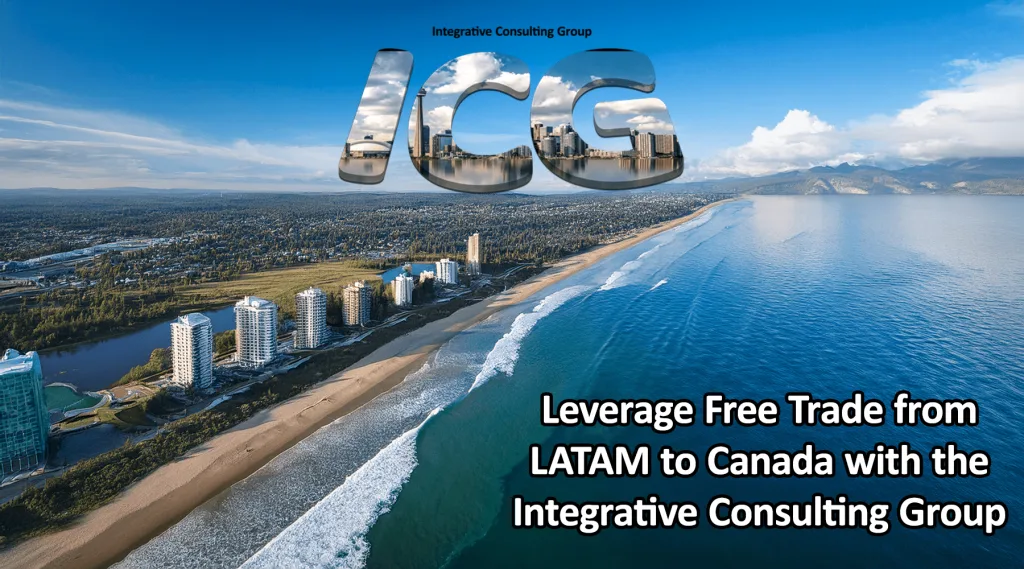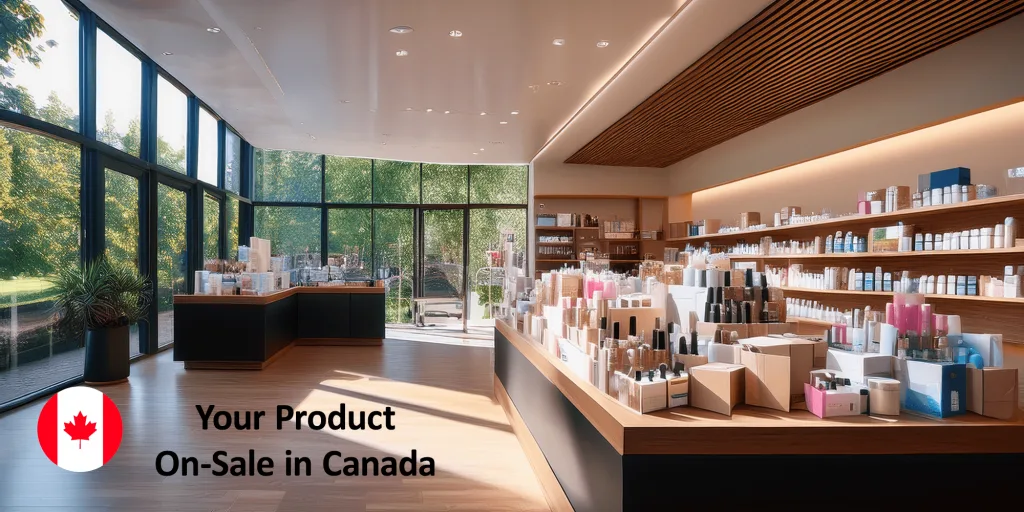
Logistic Considerations When
Exporting Skincare Products to Canada
Introduction
Exporting skincare products into Canada, with all its logistics considerations, can be a lucrative move for LATAM-based companies—but it’s not without its hurdles. From shipping regulations to product approvals, the logistics can be—well, a bit of a maze. Add in the fact that some skincare ingredients fall under “dangerous goods” classifications, and suddenly you’re knee-deep in paperwork and compliance lingo. But don’t worry, we’re here to untangle that mess. Whether you’re a first-time exporter or looking to refine your operations, this guide breaks down the essentials you really need to know
At Integrative Consulting Group, we specialize in helping LATAM exporters bring their products into the Canadian market—efficiently, legally, and profitably. Think of us as your logistics co-pilot. We’ll explore how free trade agreements help reduce your costs, why certain essential oils might raise red flags at customs, and how our team manages everything from regulatory submissions to import brokerage. So, let’s get your products moving—smartly and smoothly.
Key Takeaways
- Free Trade Agreements between Canada and LATAM countries can significantly reduce tariffs and streamline customs processes for skincare exporters.
- Dangerous Goods Regulations may apply to some skincare items like glycolic acid peels or certain essential oil extracts—knowing this in advance avoids costly delays.
- Integrative Consulting Group can act as your Canadian importation agent, ensuring smooth compliance and logistics management from end to end.
- Import Brokerage Services offered by Integrative Consulting Group save time and mitigate the risks of misclassification, incorrect valuation, or documentation errors.
- Regulatory Pre-Approval is critical before shipment—Canada has strict guidelines, and skipping this step can block your products at the border.
- Expert Compliance Support from Integrative Consulting Group ensures every label, claim, and formulation meets Health Canada’s regulatory standards.
Free Trade Agreements with LATAM Countries: A Competitive Edge
Exporters from Latin America are in luck—Canada has several free trade agreements (FTAs) with countries across the region, including Chile, Colombia, Peru, Panama, and Mexico (through USMCA). These agreements eliminate or significantly reduce import tariffs on skincare products, making your pricing more competitive in the Canadian market.
In addition to tariff reductions, FTAs streamline customs clearance by standardizing documentation and providing predictable treatment of goods. For skincare exporters, this means fewer bureaucratic hiccups and faster time-to-market. However, to benefit from these perks, your products must meet the “rules of origin” requirements, which prove that the goods were primarily manufactured or sourced in a participating country.
Integrative Consulting Group helps ensure your export meets all FTA compliance needs. We assist in certifying origin documents and structuring your shipment to qualify for preferential treatment. With our help, you can unlock cost savings while improving delivery timelines—win-win!
Shipping Dangerous Goods: What You Need to Know
Skincare and Essential Oils That May Be Classified as Dangerous Goods
You wouldn’t expect your soothing lavender toner or glycolic acid serum to be considered hazardous, but international shipping regulations might say otherwise. Under Canada’s Transportation of Dangerous Goods (TDG) Act and international standards like IATA and IMDG, certain skincare ingredients—especially active chemicals and volatile essential oils—can be flagged as “dangerous goods.”
Here are a few examples:
- Glycolic acid skin peels with concentrations above certain thresholds may be corrosive.
- Retinoids and some hydroxy acids can trigger classification based on toxicity or flammability.
- Essential oil extracts such as clove, cinnamon, or tea tree oils may be flammable or irritants depending on purity.
Shipping these products without proper labeling, packaging, and documentation can lead to delays, fines, or even seized goods. Integrative Consulting Group identifies products that meet these definitions and ensures they’re shipped in full compliance with dangerous goods regulations—saving your team from costly surprises.
Why Work with Integrative Consulting Group as Your Importation Agent?
Acting as your Canadian importation agent, Integrative Consulting Group serves as your local representative—ensuring that everything from regulatory filings to customs declarations is handled with precision. This role is especially vital for LATAM businesses that don’t have a physical presence in Canada.
As your importation agent, we:
- Represent your products to Health Canada and other regulatory bodies.
- Manage logistical coordination between carriers, brokers, and warehousing providers.
- Oversee compliance documentation to ensure every shipment meets Canadian import laws.
This boots-on-the-ground support reduces communication gaps and helps you sidestep expensive errors. Think of us as the bridge between your LATAM operations and the Canadian market—making sure everything flows, legally and logistically.
Import Brokerage Services: Simplifying Complex Logistics
Import brokerage is more than just filling out forms—especially for regulated goods like skincare. One misclassified product or missing HS code can lead to duty overpayments, penalties, or shipment delays. That’s where our brokerage services come in.
At Integrative Consulting Group, we:
- Prepare and file accurate customs declarations.
- Classify goods correctly to minimize duties and taxes.
- Liaise with Canadian Border Services Agency (CBSA) on your behalf.
- Resolve customs holds, valuation disputes, or documentation requests.
Here’s a snapshot of the benefits:
| Benefit | How It Helps You |
|---|---|
| Accurate Classification | Avoids overpayment and compliance issues |
| Seamless Communication | Speeds up customs clearance |
| Regulatory Knowledge | Prevents delays due to missing documentation |
| Hands-On Problem Resolution | Mitigates risks of shipment rejection |
With us handling brokerage, your team can focus on product development and marketing—while we handle the border details.
Regulatory Approval: Why It Should Happen Before Export
Skincare regulations in Canada fall under Health Canada’s Cosmetic Program, which mandates pre-market notification of all cosmetic products. Submitting the Cosmetic Notification Form (CNF) before shipping is essential—otherwise, your product can be denied entry or pulled from shelves post-arrival.
Key compliance requirements include:
- Listing all product ingredients using INCI names.
- Ensuring claims don’t stray into therapeutic territory (unless approved).
- Proper bilingual labelling (English and French).
- Adhering to ingredient concentration limits (e.g. for salicylic acid, hydroquinone, etc.)
Integrative Consulting Group helps exporters prepare and file regulatory submissions with precision. We identify any red flags, review claims and labeling, and track your submissions to ensure approval is in place before that first shipment even leaves LATAM. It’s not just best practice—it’s essential for keeping your business on track.
Expert Regulatory Support: How Integrative Consulting Group Makes a Difference
Regulatory compliance in Canada is detailed, and the process can feel overwhelming—especially when exporting from abroad. That’s why our team offers end-to-end support, combining legal expertise, regulatory insight, and industry-specific knowledge to guide you every step of the way.
Here’s what we cover:
- Label & Ingredient Review: Ensuring compliance with Canadian cosmetic regulations.
- CNF Submission: Preparing and filing Cosmetic Notification Forms with Health Canada.
- Product Classification: Determining whether a product is a cosmetic, drug, or natural health product (NHP).
- Language Compliance: Making sure your labels meet bilingual requirements.
Our consultants act as an extension of your team, helping you avoid regulatory missteps that delay market entry. With deep experience in Canadian skincare regulations, we don’t just advise—we implement. That means faster approvals, smoother launches, and fewer compliance headaches.
Conclusion
Successfully exporting skincare products from LATAM to Canada involves far more than packing a box and calling FedEx. From navigating free trade agreements to classifying glycolic acid serums as dangerous goods, the logistics can get tricky—fast. Add to that Canada’s strict regulatory environment, and suddenly, doing things “by the book” becomes your smartest business move.
That’s where Integrative Consulting Group comes in. We specialize in simplifying the complex, managing everything from regulatory pre-approvals to import brokerage and dangerous goods classification. With our team by your side, you get more than a consultant—you get a partner who knows the ins, outs, and all the fine print. Ready to get your products on Canadian shelves with confidence? Let’s make it happen—together.
FAQs
What LATAM countries have free trade agreements with Canada?
Countries like Chile, Mexico, Peru, Colombia, and Panama have free trade agreements with Canada. These agreements reduce tariffs and simplify customs procedures for exporters.
Are all essential oils considered dangerous goods for shipping?
Not all, but some essential oils—especially those with high concentrations or flammable properties—can be classified as dangerous goods. Proper classification and packaging are key to avoid issues at customs.
What happens if I ship skincare products without regulatory approval?
Your shipment could be held, returned, or even destroyed at the Canadian border. Health Canada requires pre-market notification for all cosmetics, so approval before shipping is essential.
Can Integrative Consulting Group act as my importer if I don’t have a Canadian office?
Yes! We can serve as your Canadian importation agent, handling logistics, compliance, and regulatory representation on your behalf.
How long does the regulatory approval process usually take?
For most cosmetics, Health Canada’s Cosmetic Notification Form is processed within 7–10 business days, but preparation and accuracy are crucial. Our team ensures submissions are error-free to avoid delays.
What kind of documentation is needed for import brokerage?
You’ll typically need a commercial invoice, bill of lading, packing list, and any regulatory approvals (like CNFs). We help ensure every document is accurate and complete.



